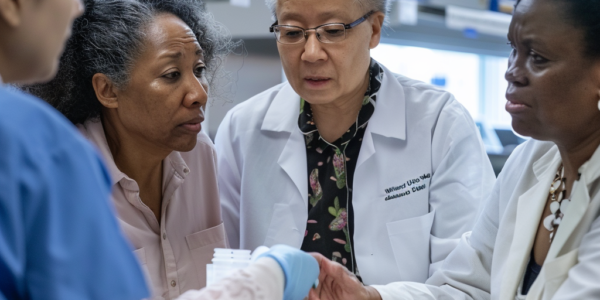NIH Scientists Rake in $710 Million in Royalties from Drug Makers During Pandemic
Recent revelations from the NIH have uncovered a $710 million royalty windfall for agency scientists during the pandemic, with NIAID receiving the bulk of $690 million. Transparency advocates are pushing for details on these lucrative deals, especially regarding COVID vaccine royalties. Dr. Fauci faces scrutiny over potential conflicts of interest, underscoring the need for accountability within the NIH.
Study Shows Minocycline Did Not Slow Vision Loss in Dry AMD
A recent clinical study at the National Eye Institute (NEI) has shown that the antibiotic minocycline did not slow vision loss or expansion of geographic atrophy in people with dry age-related macular degeneration (AMD). The study aimed to test whether inhibiting microglia with minocycline might help slow geographic atrophy expansion and its corresponding vision loss, but found no difference in geographic atrophy expansion rate or vision loss with minocycline. This study provides valuable insights into potential treatments for dry AMD and the role of inflammation in the progression of the disease.
NIH Discontinues COVID-19 Treatment Guidelines
The National Institutes of Health (NIH) has discontinued its guidance on COVID-19 treatment as the availability of treatments like Pfizer’s Paxlovid has evolved. The decision reflects the evolving landscape of COVID-19 treatment and the decreasing frequency of meetings and discussions by the guideline group.
Study Shows Black Veterans with New-Onset CKD Have Higher Incidence of Kidney Failure Than White Counterparts
Recent study finds Black veterans with new-onset chronic kidney disease have significantly higher cumulative incidence of kidney failure compared to white veterans. The research, conducted over a 10-year period, also found that Black veterans were on average 7.8 years younger than white veterans at the onset of CKD. Dr. Guofen Yan highlighted the significance of the findings, stating that previous studies on racial differences in kidney failure have been limited and outdated in their methodologies.
Washington University School of Medicine Joins National Clinical Trials Network for Cancer Screening
Washington University School of Medicine in St. Louis has joined a new national clinical trials network launched by the National Cancer Institute (NCI) to investigate emerging technologies for cancer screening. The goal of the network is to reduce cancer-related illnesses and deaths, with a key priority being the inclusion of participants from diverse populations. Collaborating with Siteman Cancer Center, the investigators will lead trials in Missouri and parts of Illinois, aiming to reach diverse populations, including those living in underserved areas. The network’s primary focus is to evaluate the effectiveness of a screening technology designed to detect multiple cancers with a single blood test, with the researchers aiming to determine whether such tests can detect cancer early and ultimately save lives.





